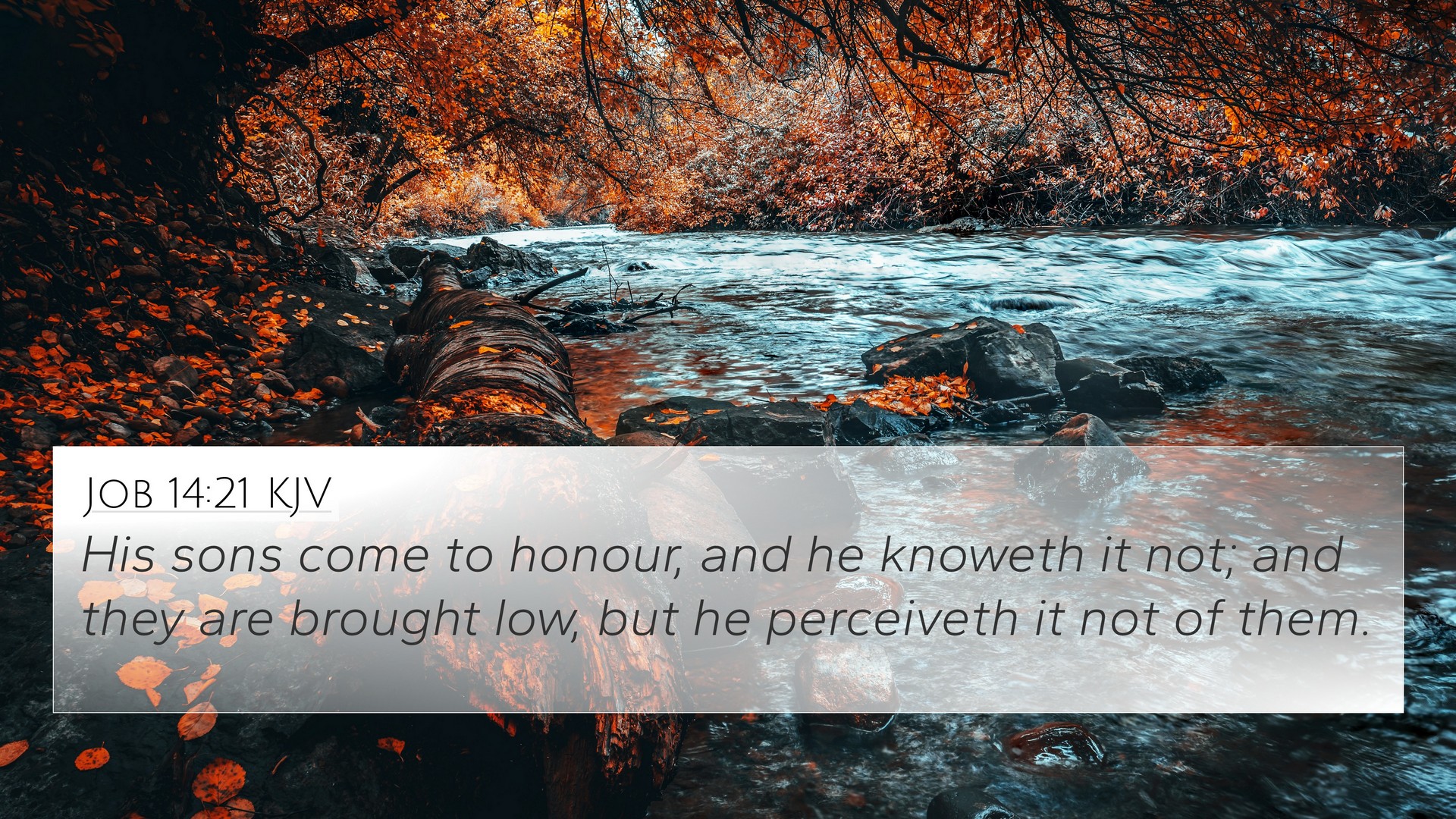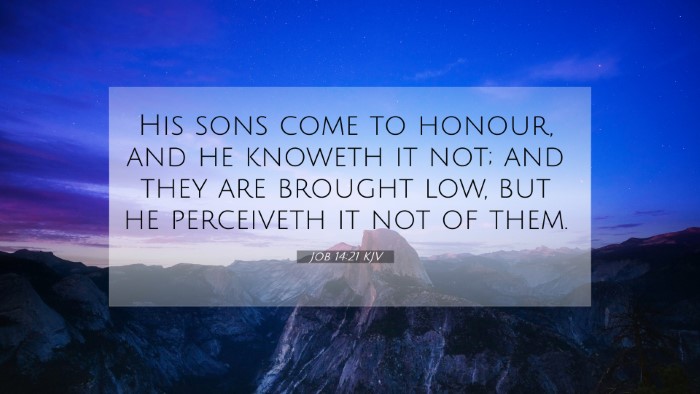Old Testament
Genesis Exodus Leviticus Numbers Deuteronomy Joshua Judges Ruth 1 Samuel 2 Samuel 1 Kings 2 Kings 1 Chronicles 2 Chronicles Ezra Nehemiah Esther Job Psalms Proverbs Ecclesiastes Song of Solomon Isaiah Jeremiah Lamentations Ezekiel Daniel Hosea Joel Amos Obadiah Jonah Micah Nahum Habakkuk Zephaniah Haggai Zechariah MalachiJob 14:21 Similar Verses
Job 14:21 Cross References
His sons come to honour, and he knoweth it not; and they are brought low, but he perceiveth it not of them.
Uncover the Rich Themes and Topics of This Bible Verse
Listed below are the Bible themes associated with Job 14:21. We invite you to explore each theme to gain deeper insights into the Scriptures.
Job 14:21 Cross Reference Verses
This section features a detailed cross-reference designed to enrich your understanding of the Scriptures. Below, you will find carefully selected verses that echo the themes and teachings related to Job 14:21 KJV. Click on any image to explore detailed analyses of related Bible verses and uncover deeper theological insights.

Ecclesiastes 9:5 (KJV) »
For the living know that they shall die: but the dead know not any thing, neither have they any more a reward; for the memory of them is forgotten.

Ecclesiastes 2:18 (KJV) »
Yea, I hated all my labour which I had taken under the sun: because I should leave it unto the man that shall be after me.
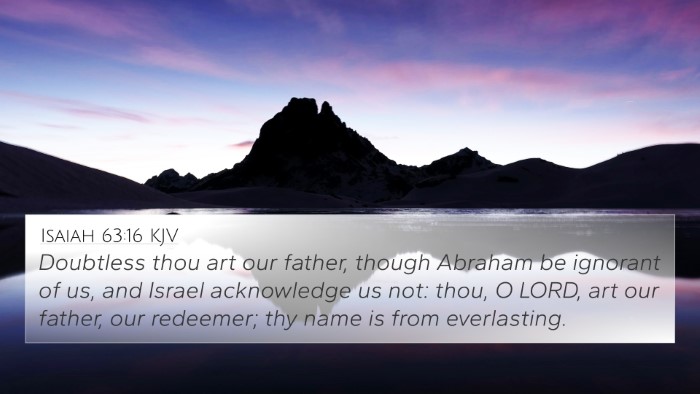
Isaiah 63:16 (KJV) »
Doubtless thou art our father, though Abraham be ignorant of us, and Israel acknowledge us not: thou, O LORD, art our father, our redeemer; thy name is from everlasting.
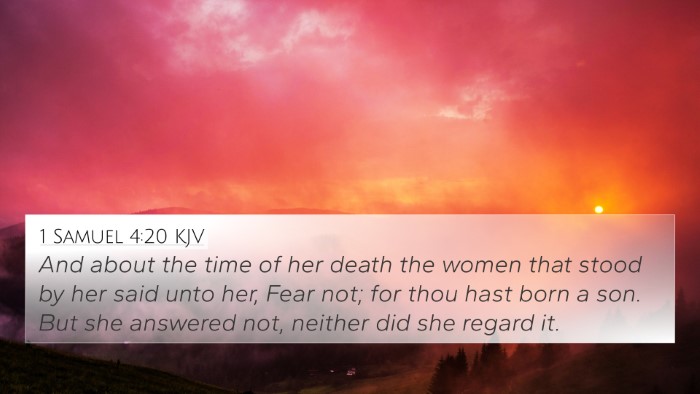
1 Samuel 4:20 (KJV) »
And about the time of her death the women that stood by her said unto her, Fear not; for thou hast born a son. But she answered not, neither did she regard it.

Psalms 39:6 (KJV) »
Surely every man walketh in a vain shew: surely they are disquieted in vain: he heapeth up riches, and knoweth not who shall gather them.
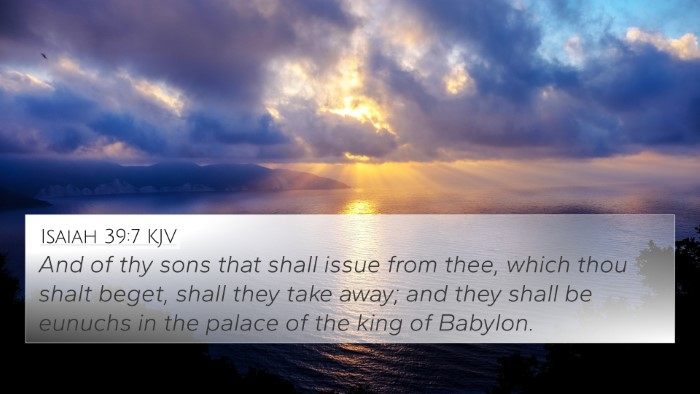
Isaiah 39:7 (KJV) »
And of thy sons that shall issue from thee, which thou shalt beget, shall they take away; and they shall be eunuchs in the palace of the king of Babylon.
Job 14:21 Verse Analysis and Similar Verses
Understanding Job 14:21
The verse Job 14:21 states: "If his children are honored, he does not know it; if they are brought low, he does not see it." This poignant observation about the nature of death and human consciousness serves as a profound reflection on mortality and the afterlife. The commentaries from Matthew Henry, Albert Barnes, and Adam Clarke provide valuable insights into its meanings and implications.
Context and Interpretation
Job, amid his suffering and reflections on mortality, illustrates the disconnection that death brings, not just to the individual but also to their relationships with the living. This verse encapsulates the idea that a deceased person is unaware of the fortunes or misfortunes of those they leave behind.
- Matthew Henry's Commentary: Henry emphasizes the emotional aspect of Job's lamentation, noting that the dead have no awareness of earthly events. He suggests this realization brings about a deep sorrow, as it underscores the finality of death and the painful disconnect it creates between the deceased and their loved ones.
- Albert Barnes's Notes: Barnes points out that the phrase indicates a complete loss of consciousness and awareness in death. He argues that this reinforces the theme of the transitory nature of life and the inevitability of death, as nothing that happens after a person's death affects them.
- Adam Clarke's Commentary: Clarke adds a theological dimension, discussing the implications of the dead's ignorance of the living's affairs. He posits that this speaks to the understanding of the soul's journey after death and suggest a need for those alive to seek righteousness in the face of mortality.
Thematic Connections
This verse opens up thematic connections to various other scriptures that explore the nature of life, death, and the awareness of the spirit after death.
- Ecclesiastes 9:5: "For the living know that they will die, but the dead know nothing." This verse parallels Job 14:21 in emphasizing the lack of awareness in death.
- Psalm 146:4: "When their breath departs, they return to the earth; on that very day their plans perish." Similar to Job’s viewpoint, this verse underscores the finality of death.
- Luke 16:19-31: The parable of the rich man and Lazarus introduces the notion of awareness in death, differentiating between the experiences of the righteous and the unrighteous.
- Philippians 1:23: "I am hard pressed between the two. My desire is to depart and be with Christ, for that is far better." Here, Paul speaks of a consciousness that persists beyond death.
- 1 Thessalonians 4:13: "But we do not want you to be uninformed, brothers, about those who are asleep, that you may not grieve as others do who have no hope." This verse indicates a hopeful perspective on death that contrasts with Job’s somber reflection.
- Revelation 14:13: "...Blessed are the dead who die in the Lord..." speaks of the blessed state of the dead, again contrasting Job’s depiction of ignorance in death.
- Job 7:9-10: These verses contribute to the discourse on the finality of death and lack of return to life, linking closely to the themes found in Job 14:21.
Cross-Referencing Biblical Texts
The insightful nature of Job 14:21 encourages a closer examination of related Bible verses and their interconnected themes. For those studying the text, using various tools for Bible cross-referencing can facilitate deeper understanding. Here are some methods to consider:
- Bible Concordance: A helpful tool to find synonyms and connections between verses.
- Bible Cross-Reference Guide: Offers a structured approach to linking verses that share common themes.
- Cross-Reference Bible Study: Engaging with scripture through thematic connections enhances biblical literacy.
- Bible Reference Resources: Access to documents that provide comprehensive insights and cross-references.
- Bible Chain References: Following links in scripture that lead to broader understanding within the biblical narrative.
Practical Applications
Incorporating the reflections of Job 14:21 into our lives can bring comfort and perspective. Understanding the finality of death can lead to a renewed focus on living purposefully. Those searching for specific Bible verses that support Job 14:21 can explore verses addressing the nature of life and death, hope, and righteousness.
Conclusion
Job 14:21 resonates deeply within the corpus of biblical literature by emphasizing the themes of mortality, disconnection, and the consciousness of the soul. By drawing connections with various biblical texts and employing cross-referencing methods, readers gain a richer understanding of scripture as a whole.
